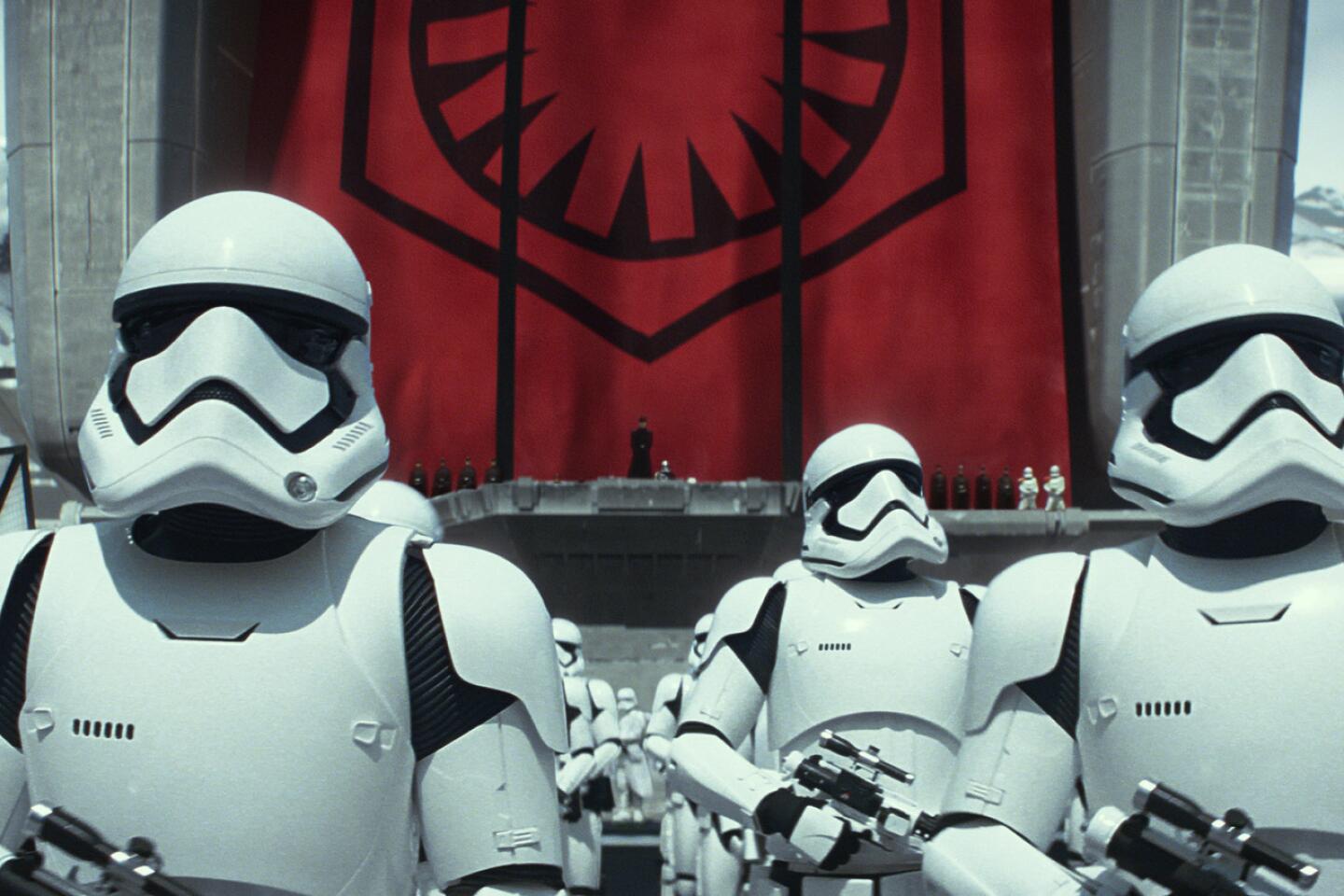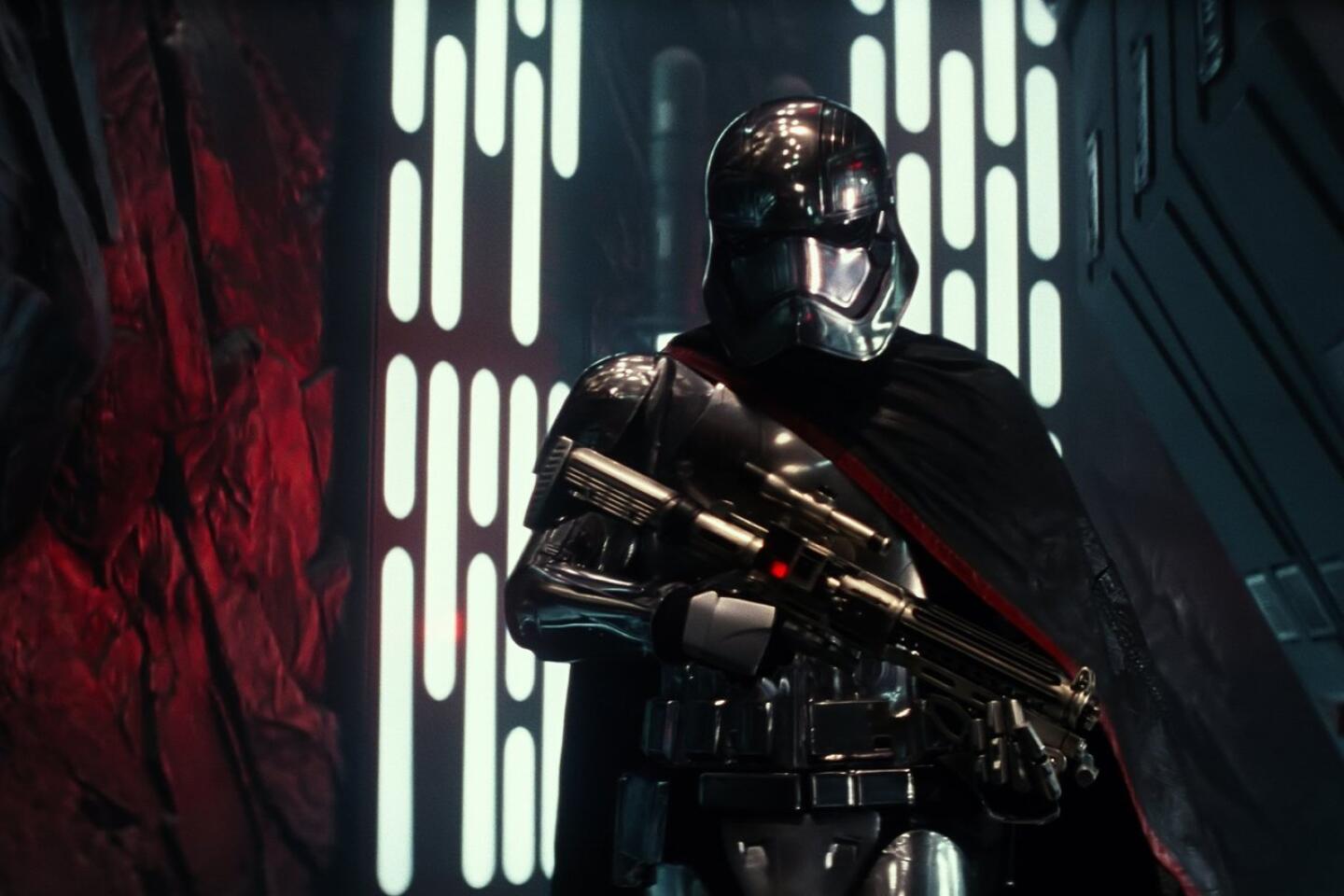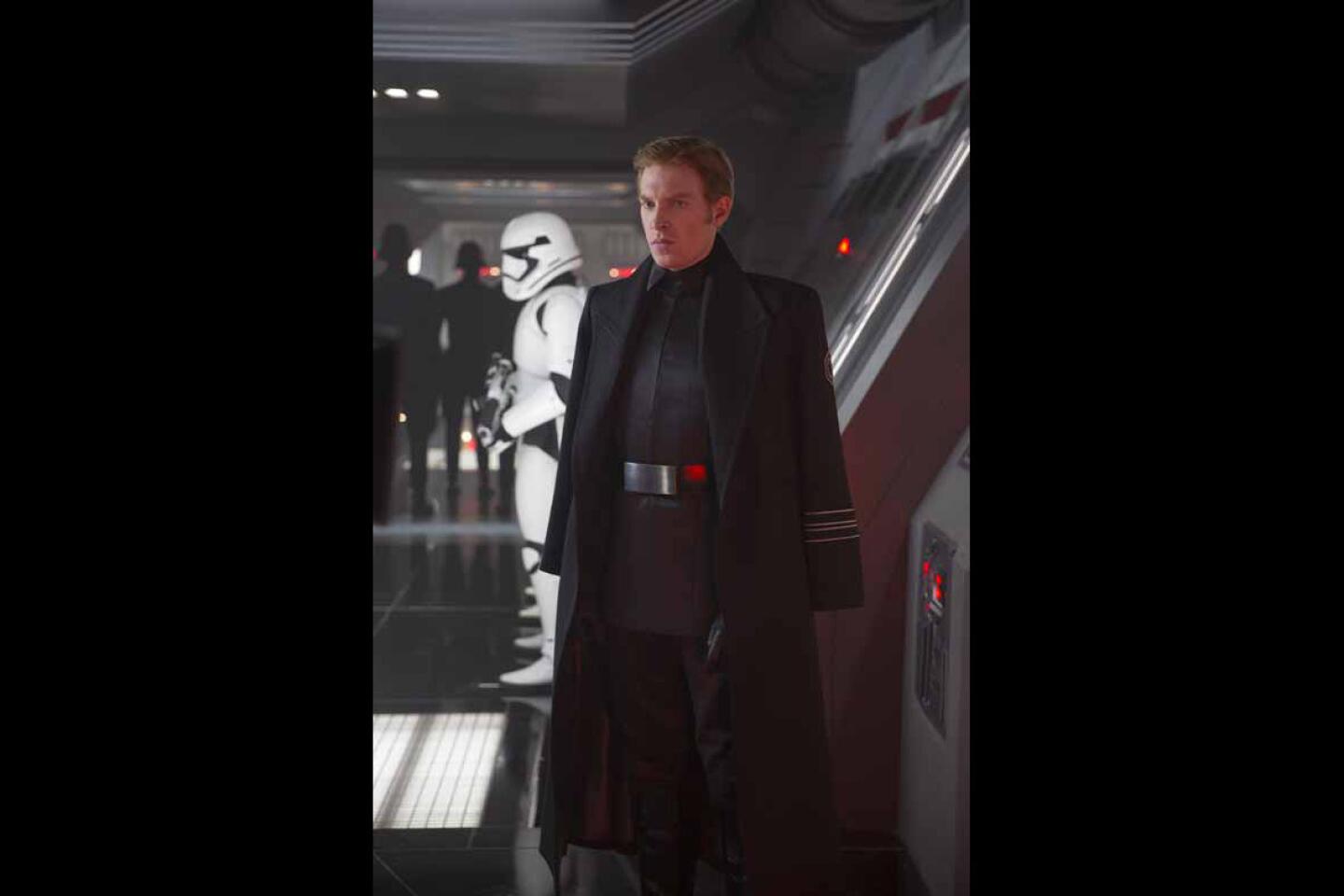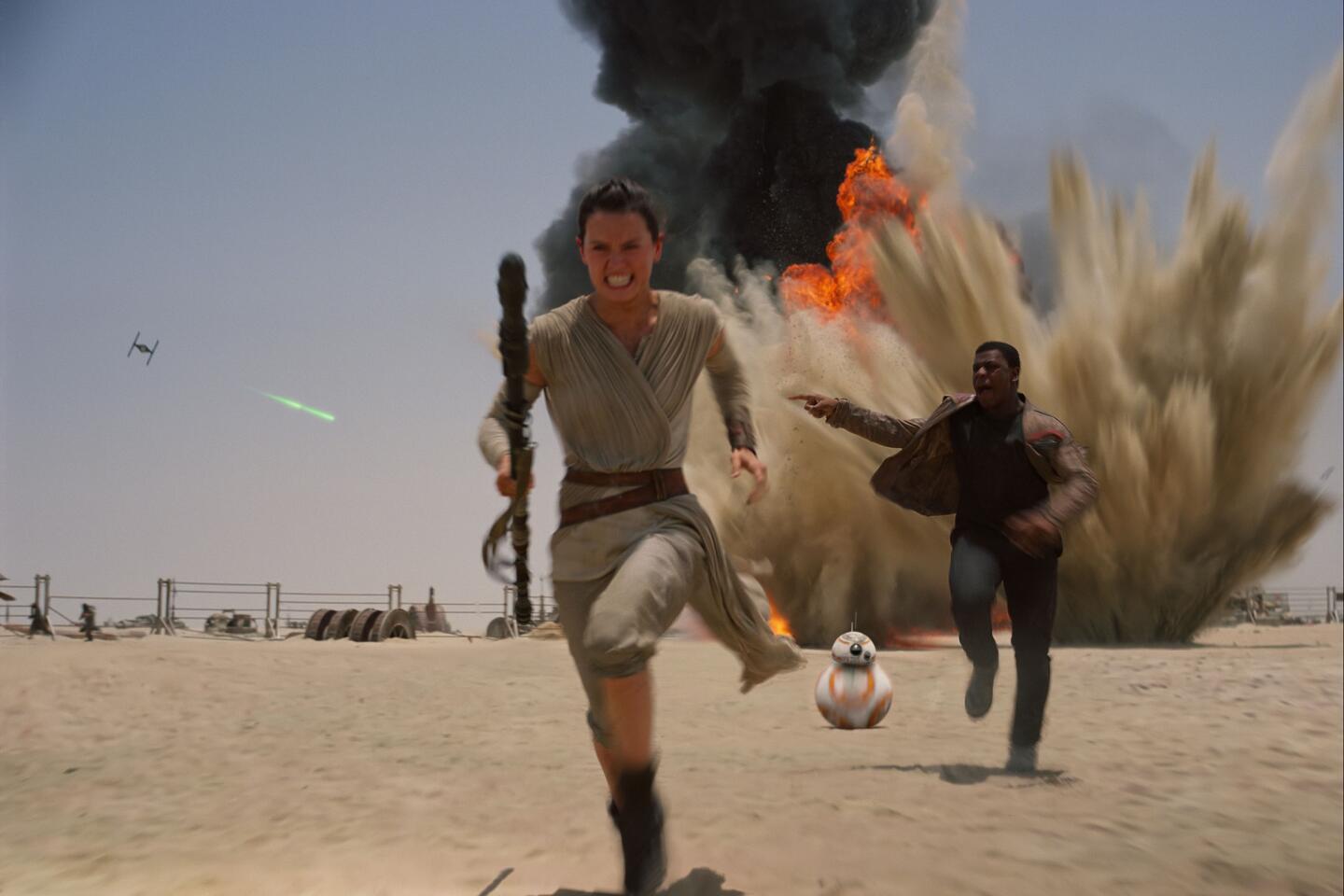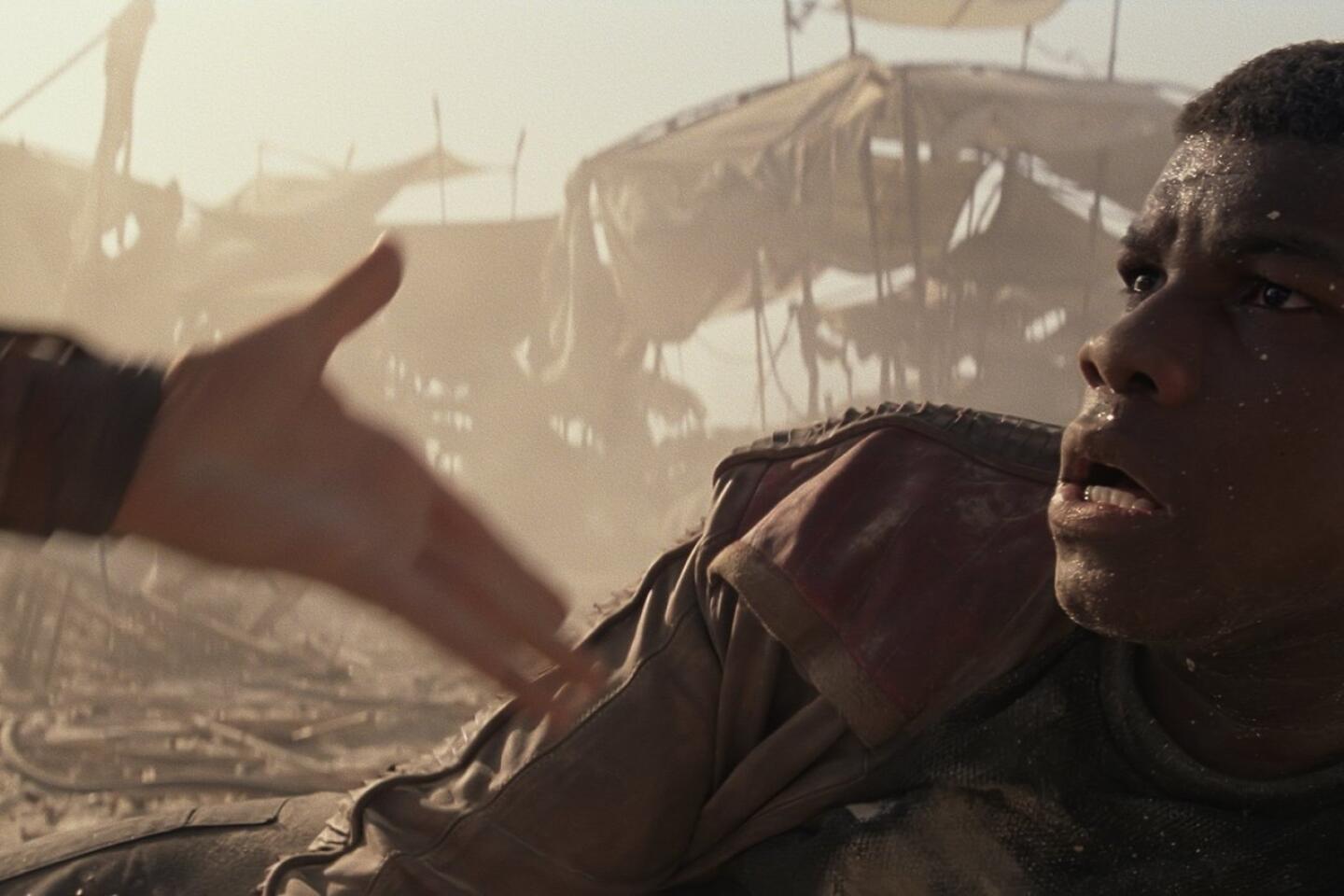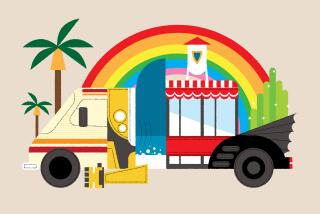The harsh reality of building a ‘Star Wars’ fantasy in Abu Dhabi
- Share via
Reporting from ABU DHABI, United Arab Emirates — Just 21/2 hours outside this ultra-modern Arab city the terrain is so alien you might as well be on another planet. Martian-red sand dunes tall as skyscrapers roll out as far as the eye can see and a fine mist of copper dust hangs in the air like low-lying fog.
The Arabian Peninsula’s Rub’ al Khali desert is the stuff of fantasy, which is precisely why “Star Wars: The Force Awakens” was shot here. In early 2014, director J.J. Abrams and nearly 800 cast and crew trekked into the largely uninhabited region known as the Empty Quarter to build, film and blow things up.
FULL COVERAGE: ‘Star Wars: Episode VII - The Force Awakens’
They had plenty of room to stage intergalactic battles. Rub’ al Khali is the world’s largest contiguous desert, a sea of sand stretching from Oman to Saudi Arabia, the United Arab Emirates (of which Abu Dhabi is the capital) to Yemen.
Presumably lured by the planet Jakku-like landscape — and the 30% cash-back rebate the government offers to those who shoot in the emirate — the “Star Wars” crew spent six months filming key scenes on a secretive closed set that was said to resemble a small city.
From Abu Dhabi, a 17-hour flight from Los Angeles, the “Star Wars” crew would have been shuttled past the city’s modern high rises, its suburbs’ pristine Mediterranean McMansions, the outskirts’ shabby workers quarters, then desolate salt flats, an occasional goat herder taking refuge under a makeshift tent and grazing camel herds.
In the company of a guide from the Abu Dhabi film authority, I am making a similar three-hour journey by SUV to the Empty Quarter. A dead, shriveled camel laying on the side of a sand dune is just one reminder that even the hardiest of creatures is no match for the Rub’ al Khali.
The guide finally stops our vehicle in an area of the desert known as Liwa, adjusting his head scarf before stepping out of the air conditioning and into the heat.
“See this hill?” he asks, pointing off into nowhere. “Behind that is where ‘Star Wars’ was shot. Now maybe you will know us for something more than camels and sand. Stormtroopers and sand,” he says, laughing.
The “Star Wars” set was off-limits to press and visitors, and those who worked on the movie during filming were sworn to secrecy about everything having to do with the production.
“We used the code Avco in everything we did in relation to ‘Star Wars,’” says Noura Al Kaabi, CEO of Abu Dhabi’s Media Zone Authority and production facility, twofour54. On her conference wall in Abu Dhabi is a giant mosaic of the emirate’s late ruler Sheikh Zayed Al Nahyan (a common sight in the region), and on the floor below, a life-size C-3PO (not so common around here). She picked up the latter from a prop store in the U.K.
“Even with the government we had to use code when speaking about it,” she says. “When I asked, ‘Why is the code word Avco?’ they said it was the name of the cinema in Los Angeles where J.J. Abrams watched ‘Star Wars’ for the first time. So sentimental, right?”
According to reports from regional papers, a “whole world” was erected in the desert and it included a “shuttle-like” spacecraft, “fast buggies” powered by jet engines, and giant craters made with explosives.
It was an arduous process scouting the site where, as one film authority rep tells me, battle scenes involving the Millennium Falcon were shot. And once they did settle on a location, there was the question of how to provide access — i.e. building roads where none had been before.
“Our contractor said, no, you can’t build here because these are all preserved sands,” Al Kaabi says. “Luckily the head of the environment agency is a good friend. I said to her, ‘We need to build a road. Whatever we have to do, we will do to get this done! It’s “Star Wars!”’”
Her friend set up a screening room and persuaded environmental inspectors to come watch a screening of the first film in the franchise. “These are men in their late 50s, and many hadn’t seen the films,” Al Kaabi says. “She said, ‘Look, this is going to be filmed in Abu Dhabi.’ They were not only watching to see what it would look like, but they started commenting, ‘Well, could I be that character?’ They wanted to be part of the set.”

Crews from Bollywood’s film industry accustomed to working in challenging terrain were flown in from nearby India to help build sets. Cast and crew from the U.S. were given detailed packets on how to survive shooting in such brutal, albeit beautiful, surrounds.
“The heat was so — ahh, my God — so intense,” says actress Daisy Ridley, who plays the fighter pilot Rey, by phone. “Like sweaty and gritty, we were filthy in it.”
Still, she adds, “It was amazing to start on location, everyone was together, everyone was bonding. And we had people making it as easy as physically possible. I think when it was difficult it needed to be. You can’t look like you’re prancing across a track field. Running through sand is really difficult.”
These desert scenes were originally slated to be shot in Jordan, another Arab country that’s a short flight from Abu Dhabi. Paul Baker, executive director of twofour54’s film & TV services and formerly of Hollywood’s Pinewood Studios, had heard “Star Wars” was looking for a desert backdrop, and contacted producer Tommy Harper.
“I said, ‘I know you may have this other place in mind, but maybe just come here and see what we have to offer,’” Baker says. “He initially passed. Then I got an email sometime later that just said, ‘Let’s talk.’ I will never delete that email,” says Baker, laughing.
Abrams and some of the crew stayed at the Empty Quarter’s Qasr Al Sarab resort, according to hotel workers who broke the code of silence. Situated off a winding road in the middle of towering sand dunes, the resort is also constructed like a set from another place and time, its stonewalls, turrets and gurgling fountains an oasis.
But “Star Wars” might have never come here if it weren’t for an aggressive push by Abu Dhabi over the last decade to establish the emirate as a media and film hub in the Arab world. Abu Dhabi, one of seven emirates that includes nearby Dubai, is among the wealthiest regions in the world thanks to its petroleum industry. But it is preparing for a not-so-distant future when the oil runs dry.
The film authority is enticing Hollywood productions with healthy rebates to shoot here and a technologically advanced infrastructure (something many of the neighboring countries lack). Its more recent successes have been “Furious 7,” “The Bourne Legacy” and “Deliver Us From Evil.” The only requirement is that these productions — including “Star Wars” — hire a small percentage of local interns so they can receive training on the job. The government has set a goal to have its own fully independent studio system up and running by 2030.
“Star Wars’” desert set has since been disassembled despite rumors that say otherwise. The film authority here is still reticent to discuss any details about what exactly was shot in the Empty Quarter, though some of it can clearly be seen in the trailer.
Even a question as simple as, “I heard rumors they had problems with the Stormtroopers’ boots melting in the desert heat” is left unanswered. Jokes a film authority rep, “It’s one more secret the desert holds.”
Staff writer Meredith Woerner contributed to this report.
MORE:
Star Wars screenwriter Lawrence Kasdan on the past, present and future of ‘Star Wars’
There’s an official ‘Star Wars’ recipe blog, and it shows you how to make Stormtrooper butter
Will audiences turn out in record force for ‘Star Wars’?
More to Read
The biggest entertainment stories
Get our big stories about Hollywood, film, television, music, arts, culture and more right in your inbox as soon as they publish.
You may occasionally receive promotional content from the Los Angeles Times.
